AI Summary
Imagine a customer just made an order from your WooCommerce store. They’re excited about their purchase, but when they get their order confirmation email there’s no logo, no formatting, and no product images. Not exactly the best first impression
While WordPress is great in many ways, one of its downsides is out of the box, it sends the ugliest emails on the internet.
Your website might be a design masterpiece with perfect branding, but your emails – order confirmations, password resets, new user welcomes – look like they’re from a completely different (much less professional) business.
Luckily, this is completely fixable. With the right email template plugin, you can transform those embarrassing default emails into professional, on-brand communications that actually strengthen your relationship with customers instead of making them question your legitimacy.
In this guide, I’ll show you exactly which plugins can rescue your WordPress emails from the dark ages, based on my own testing across multiple sites.
Why WordPress Email Templates Are Essential
Before looking at each plugin, let’s understand why well-designed email templates can make such a difference for your WordPress site.
Brand Consistency and Professional Appearance
Your emails are an extension of your brand. When customers receive a well-designed email that matches your website’s look and feel, it builds trust and reinforces your professional image. Plain text emails from WordPress make your business look amateur and can damage credibility.
Improved Engagement and Conversion Rates
Professional email templates with clear calls-to-action, proper formatting, and mobile optimization can significantly boost your email engagement.
Better User Experience
Your customers expect professional communication. Whether it’s order confirmations, password resets, or newsletter campaigns, attractive, easy-to-read emails create a positive experience that keeps customers coming back.
SMTP & Deliverability Plugins
The most beautiful email template in the world is useless if it doesn’t reach the inbox. This is why combining great design with reliable deliverability should be your top priority.
WP Mail SMTP – Fix WordPress Email Delivery
WP Mail SMTP is the most popular WordPress email plugin, designed to fix email deliverability issues by routing your emails through reliable SMTP services instead of WordPress’s default PHP mail function.
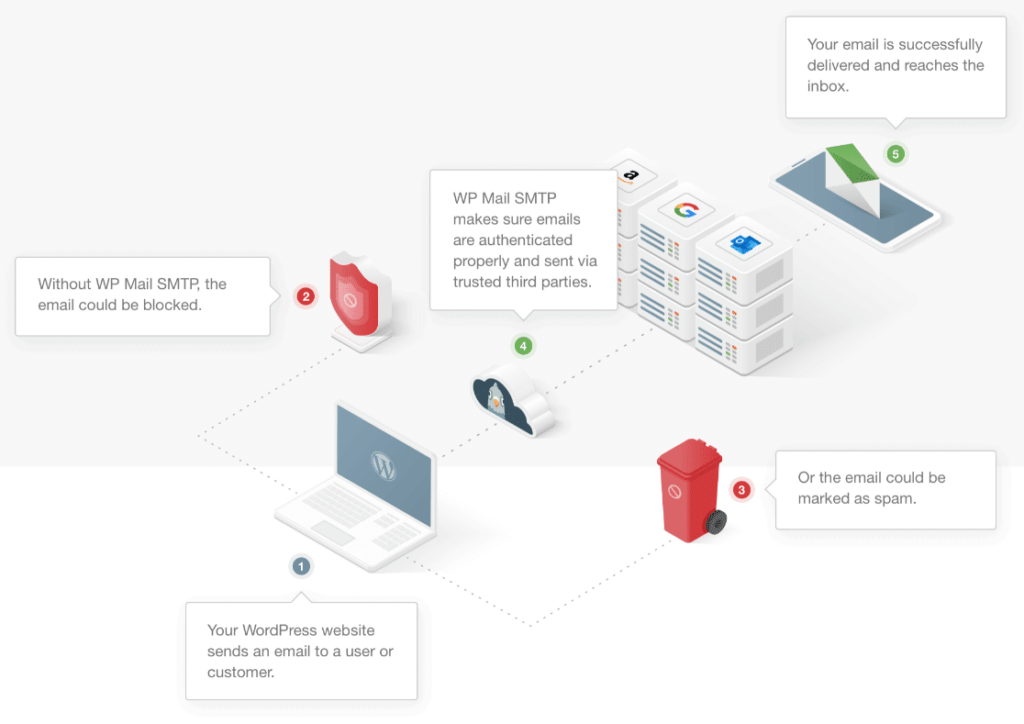
Key Features:
- Works with any email service (Gmail, SendLayer, SMTP.com, Brevo, Outlook, and more)
- Email logging and tracking
- Email failure alerts
- Backup connection options
- One-click setup for popular services
- White Glove Setup available (email experts do all the setup for you)
I install WP Mail SMTP on every WordPress site I build and it helps to eliminate the vast majority of email deliverability issues. The Pro version’s email logging has saved me countless hours of troubleshooting to investigate missing emails, and the backup connection feature is particularly valuable for high-traffic sites that might hit sending limits or when prompt email delivery is crucial to the running of your business..
Best for: Every WordPress site that sends emails. This isn’t optional in my book.
Pricing: Free version available; Pro plans start at $49/year
Email Marketing Plugins
MailPoet – All-in-One Email Solution
MailPoet is a comprehensive email marketing plugin built specifically for WordPress, offering both template design and email delivery in one package.
I’ll admit, I was initially dismissive of MailPoet. My thinking was, why run email marketing from WordPress when services like Mailchimp exist? But after I actually tried the plugin, I was pleasantly surprised.

Key Features:
- Drag-and-drop email builder
- Pre-designed templates
- Newsletter automation
- Subscriber management
- WooCommerce integration
- Built-in sending service
My Experience: The drag-and-drop builder is genuinely intuitive, and I was impressed with the WooCommerce integration – it automatically pulls in product images, prices, and creates abandoned cart emails that actually look professional.
The automation features are also very strong. For example, you can set up a welcome series for a membership site that triggers based on user registration, segments based on their selected interests, and follows up with targeted content.
Pros:
- Complete solution within WordPress
- User-friendly interface
- Excellent WooCommerce integration
- Automatic list building from WordPress users
Cons:
- Can impact site performance with large lists (5,000+ subscribers)
- Limited customization compared to specialized design tools
- Sending limits on free plan
My Verdict: Perfect for small to medium businesses that want to keep everything in WordPress. The WooCommerce integration alone makes it worth considering for online stores.
Pricing: Free for up to 1,000 subscribers; paid plans start at $10/month
The Newsletter Plugin – Powerful Newsletter Builder
The Newsletter plugin transforms WordPress into a complete email marketing platform, focusing on simplicity and unlimited sending without per-subscriber fees. If you want to keep your email marketing in-house and avoid the recurring costs of external services, this is a great choice. It’s been around for years and has a solid reputation.
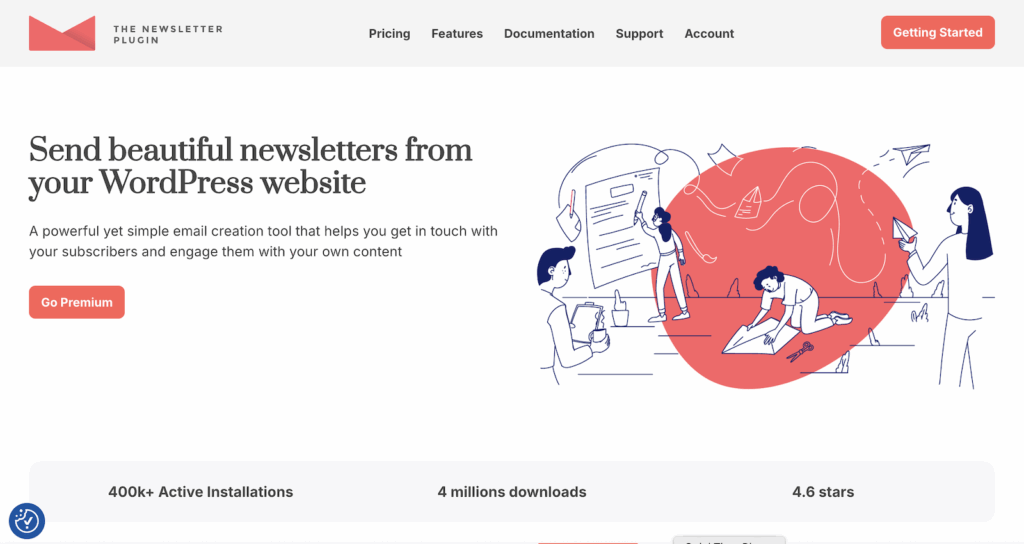
Key Features:
- Multiple email templates
- Subscriber segmentation
- Automation workflows
- Detailed reporting
- GDPR compliance tools
- One-time payment option
My Experience: This plugin takes a different approach with its template system – it’s more code-friendly than drag-and-drop focused. While this might seem like a downside, I actually find it more efficient for creating consistent branded templates that can be quickly duplicated and modified.
Pros:
- Simple, focused approach
- One-time payment option (great for budget-conscious projects)
- Good template variety
- Lightweight and won’t slow down your site
Cons:
- Basic automation compared to dedicated platforms
- Limited advanced features
- Reporting could be more detailed
My verdict: Excellent value for money if you need basic newsletter functionality without ongoing costs. Great for blogs, non-profits, or sites with simple newsletter needs. Not suitable if you need advanced automation or detailed analytics.
Pricing: From $69 for a single site license
Mailster – Premium Email Marketing Solution
Mailster is a self-hosted email marketing plugin that handles everything from newsletters to complex automation workflows directly from your WordPress dashboard.
I’ve found Mailster to be one of the better email marketing plugins available for WordPress, though it requires a bigger upfront investment than free alternatives.
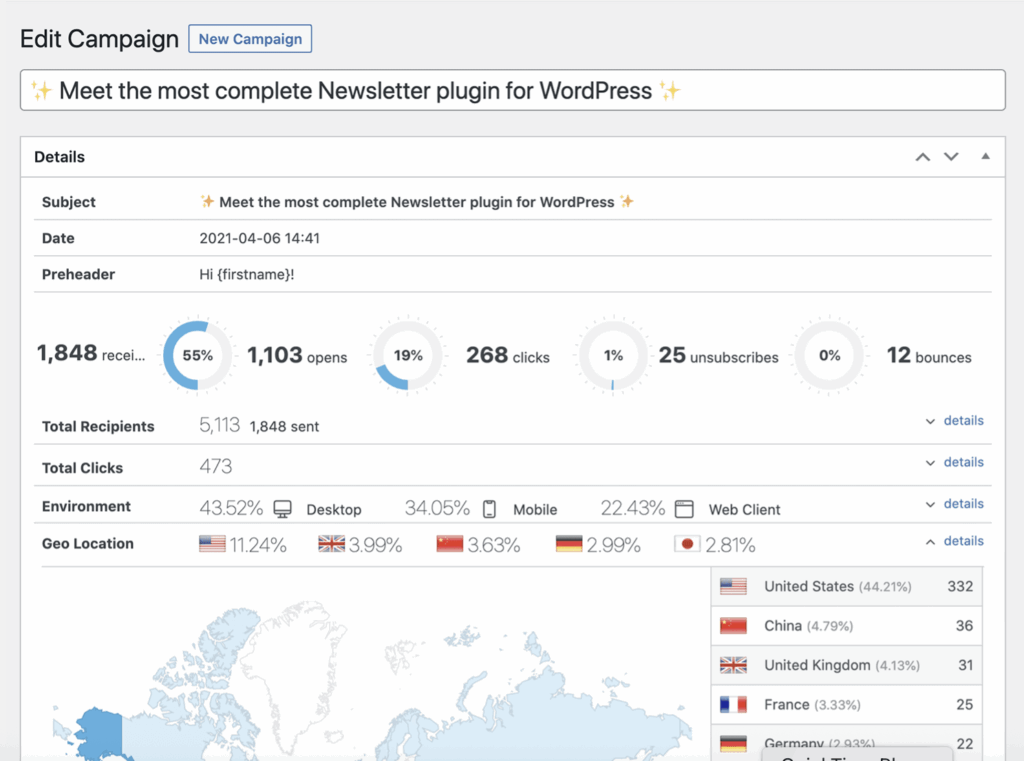
Key Features:
- Advanced automation workflows with conditional logic
- Unlimited subscribers and campaigns
- 400+ professional email templates
- RSS-to-email functionality
- Time zone-based sending
- WooCommerce and membership plugin integrations
My experience: The automation capabilities are genuinely impressive. You can create sophisticated email sequences that trigger based on user actions, purchase behavior, or engagement levels. The WooCommerce integration works particularly well for creating abandoned cart sequences and post-purchase follow-ups.
Pros:
- No monthly subscriber limits or sending restrictions
- Powerful automation engine
- Complete data ownership
- Professional template library
- Reliable RSS-to-email functionality
Cons:
- Premium-only pricing (no free version)
- Requires external SMTP service for delivery
- Interface has a learning curve
- Can feel overwhelming for simple newsletter needs
My verdict: Self-hosting your email marketing means your subscriber data stays on your server, which should appeal to privacy-conscious businesses. There are also no ongoing per-subscriber fees once you’ve purchased the license.
Pricing: From $79/year for a single site license
WooCommerce-Specific Plugins
If you’re running a WooCommerce store, your emails are a cruical part of how you communicate with your customers. Purchase receipts, abandoned cart reminders, shipping notifications, and promo emails can all make or break your store’s success so investing in a good email template plugin can be a wise choice.
EmailKit – WooCommerce Email Powerhouse
EmailKit specializes in customizing WooCommerce transactional emails with a powerful drag-and-drop builder designed specifically for online stores.
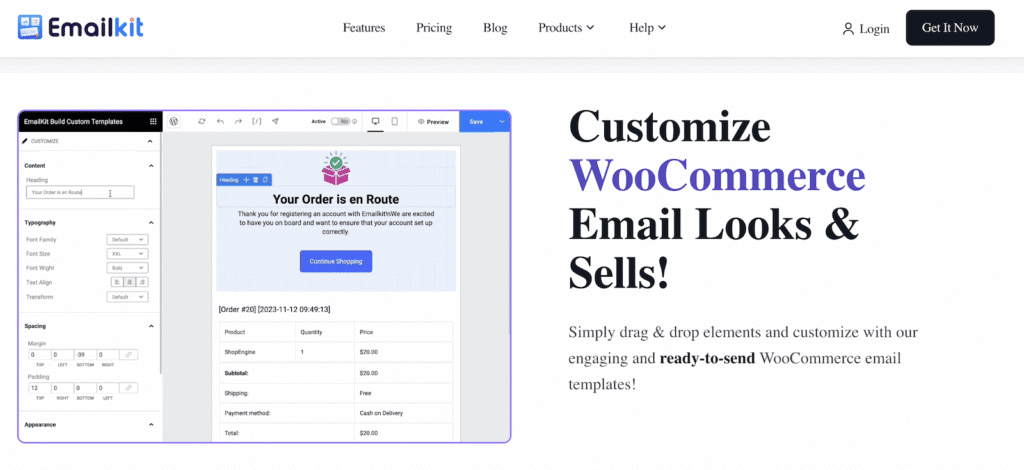
Key Features:
- 17+ customizable elements
- Real-time preview with actual order data
- All WooCommerce email types covered
- Mobile-responsive templates
- Conditional content based on order details
- Product recommendation blocks
My Experience: EmailKit templates look professional and on-brand. The option to create customized order confirmation emails with product recommendations is fantastic.
Pros:
- Designed specifically for WooCommerce needs
- Real-time preview with actual order data
- Product recommendation blocks built-in
- Different templates for customer segments
Cons:
- Only works with WooCommerce
- Limited to transactional emails
- Pro version needed for advanced features
- No newsletter or marketing email support
My verdict: If you run a WooCommerce store, the impact on customer perception and repeat purchases more than justifies the cost.
Pricing: Fom $45 for a single site license
WooCommerce Email Customizer with Drag & Drop Builder (by Flycart)
This plugin provides advanced customization of WooCommerce email templates with powerful conditional logic capabilities.
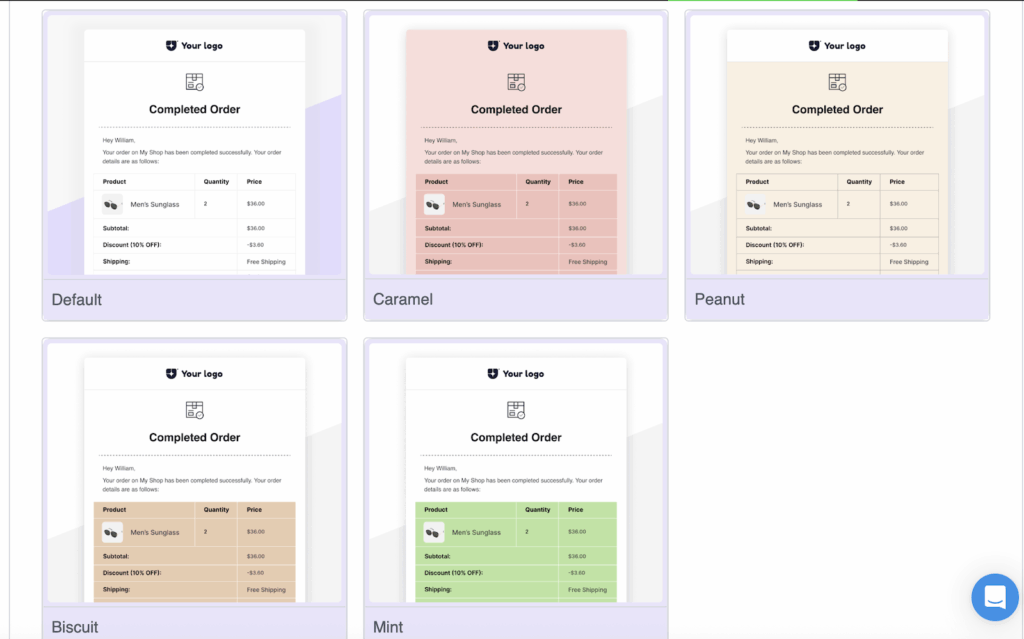
Key Features:
- Visual drag-and-drop editor
- Advanced conditional logic
- Multi-recipient notifications
- Role-based email templates
- Personalized messaging
- Real-time preview
My Experience: The learning curve is steeper than EmailKit. It took me a good day to really understand all the features and how to use them effectively. But once I got the hang of it, I created some truly complex email flows that would have required custom development otherwise.
My verdict: Best for advanced users or stores with complex requirements. If you need simple, beautiful emails, go with EmailKit. If you need powerful conditional logic and complex routing, this is your plugin.
Pricing: From $60 for a single site license.
YITH WooCommerce Email Templates – Straightforward Store Email Branding
YITH WooCommerce Email Templates is a premium plugin focused specifically on customizing WooCommerce transactional emails with professional templates and branding options.
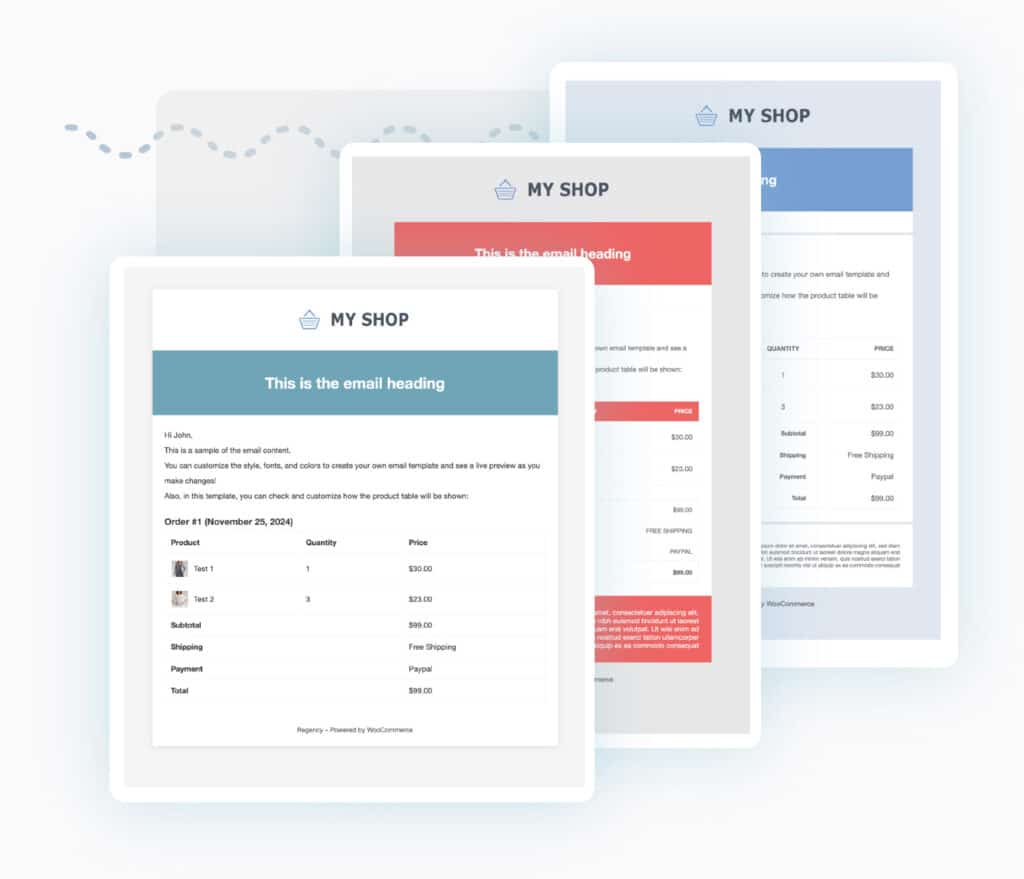
Key Features:
- Four pre-built professional templates (Default, Informal, Casual, Elegant)
- Unlimited custom templates for different occasions
- Complete branding control (logos, colors, typography, social media icons)
- Live preview functionality
- Template assignment per email type
My experience: The plugin is very easy to use. You just pick a base template, customize your branding elements, and you’re done. The live preview feature actually works well, which isn’t always the case with email template plugins.
The seasonal template options are a nice touch – I’ve used them for holiday sales campaigns where the email templates match the promotional theme.
My verdict: This plugin is a great choice for WooCommerce store owners who want quick, professional improvements to their email appearance without learning complex design tools. Particularly good if you’re already using other YITH plugins.
Pricing: € 89,99/ year
General Template Builders
WPForms – More Than Just Contact Forms
While WPForms is primarily known as a form builder, it also includes email notification customization features that many users overlook, making it a solid option for styling transactional emails.
I’ve been using WPForms for years, and one feature that consistently impresses clients is how professional their form notification emails can look with just a few tweaks.
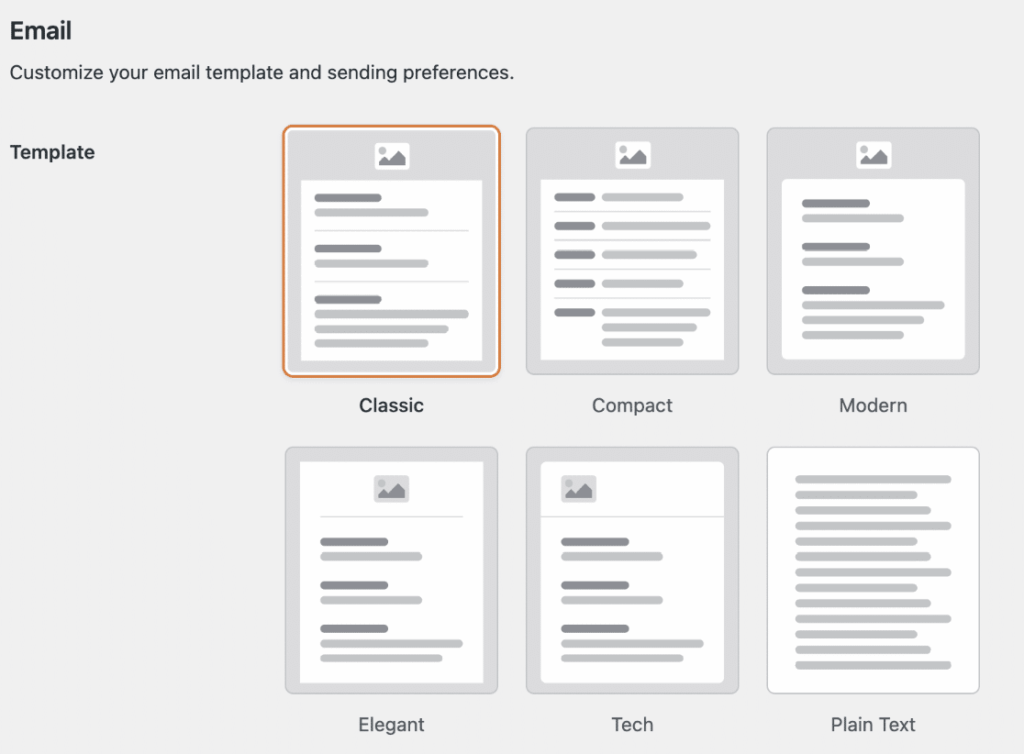
Email notification features:
- Multiple pre-designed email templates
- Custom header images and branding
- Color scheme and typography customization
- Global template settings or form-specific overrides
- HTML email formatting
- Smart tags for dynamic content
- Integration with email marketing services
My experience: The email template customization is flexible and easy to use. You can upload your logo as a header image, match your brand colors, and choose typography that aligns with your site design. The smart tags also work well for personalizing emails with form data, user information, and site details.
Pros:
- Easy-to-use template customization interface
- Professional-looking results without coding
- Consistent branding across all form emails
- Works with any type of form (contact, registration, survey, etc.)
- Reliable email delivery when paired with WP Mail SMTP
Cons:
- Not designed for marketing emails or campaigns
- Template customization is more basic than specialized email plugins
My verdict: WPForms is ideal for sites that rely heavily on forms and want their notification emails to look professional and branded. Particularly valuable for service businesses, membership sites, and contact-heavy websites.
Pricing: Free version available with basic email features; Pro plans start at $49.50/year for advanced email customization options
Elemailer – Elementor-Powered Email Templates
Elemailer is a freemium plugin that lets you design email templates using Elementor’s drag-and-drop interface, specifically for customizing emails sent by Contact Form 7 and Elementor Pro forms. If you’re already comfortable with Elementor, this plugin feels instantly familiar.
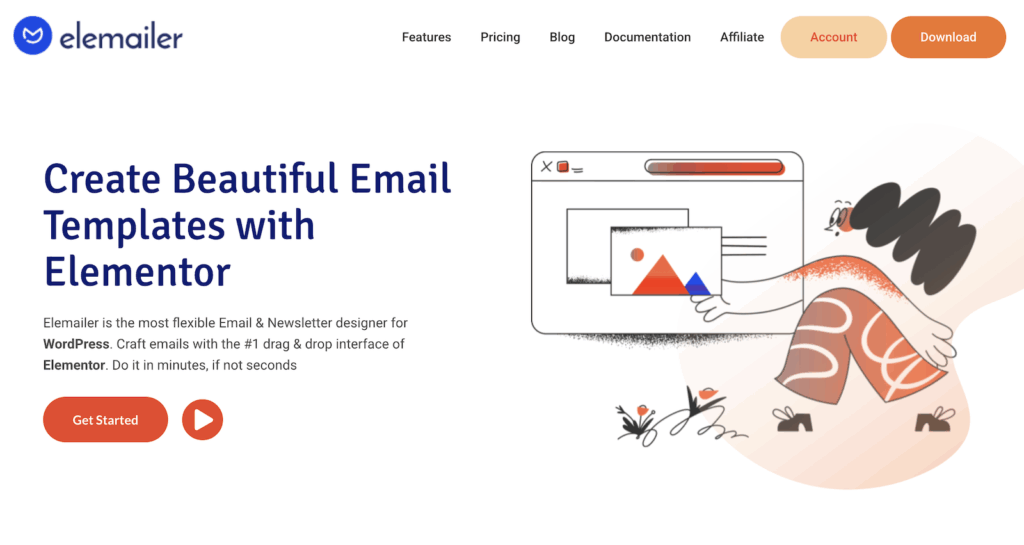
Key Features:
- Uses Elementor’s drag-and-drop builder for email design
- Overrides default Contact Form 7 and Elementor Pro form emails
- AI writing assistance for email content
My experience: The plugin essentially adds email template design as another Elementor editing option. If you know how to build pages with Elementor, you can design emails the same way. The AI writing feature is a nice bonus for generating email copy, though I still prefer writing my own content for important communications.
Pros:
- Familiar Elementor interface for existing users
- Free version includes core functionality
- Clean integration with popular form plugins
- No learning curve if you already use Elementor
Cons:
- Only useful if you’re already using Elementor
- Three template limit in free version
My verdict: Elementor users who want to upgrade their Contact Form 7 or Elementor Pro form notifications from plain text to professionally designed emails might want to check out this plugin.
Pricing: Free (Lite version); Pro version available from $33
Frequently Asked Questions
Do I need a separate SMTP plugin if my template plugin includes sending features? Yes, I recommend using a dedicated SMTP plugin like WP Mail SMTP regardless. It provides better reliability, detailed logging, and professional email service integrations that template plugins can’t match.
Can I use multiple email template plugins on the same site? Yes, as long as they handle different email types. For example, EmailKit for WooCommerce emails and MailPoet for newsletters work well together without conflicts.
How do I know if my email templates are mobile-friendly? Most plugins include preview features, but always test by sending emails to yourself and viewing on actual devices. Check for text size, button accessibility, and proper layout rendering.
What’s the difference between transactional and marketing email templates? Transactional emails (order confirmations, password resets) are triggered by user actions and require immediate delivery. Marketing emails (newsletters, promotions) are sent to groups and focus on engagement. Some plugins specialize in one type.
Can these plugins help with email deliverability issues? Template plugins primarily handle design. For deliverability improvements, you need an SMTP plugin like WP Mail SMTP. However, well-designed templates can improve engagement metrics, which helps long-term deliverability.
Start with the Foundation
The path to professional WordPress emails is clear: start with WP Mail SMTP to ensure reliable delivery, then add the template plugins that match your specific needs.
Whether you’re running a simple blog or a complex eCommerce store, combining reliable email delivery with professional templates will significantly improve your user experience and business results.
Next, Improve Your Email Design
Want to create your own email templates or customize them for optimal success? Check out our email design tips and best practices to help you create emails that look fantastic.
Ready to fix your emails? Get started today with the best WordPress SMTP plugin. If you don’t have the time to fix your emails, you can get full White Glove Setup assistance as an extra purchase, and there’s a 14-day money-back guarantee for all paid plans.
If this article helped you out, please follow us on Facebook and Twitter for more WordPress tips and tutorials.

